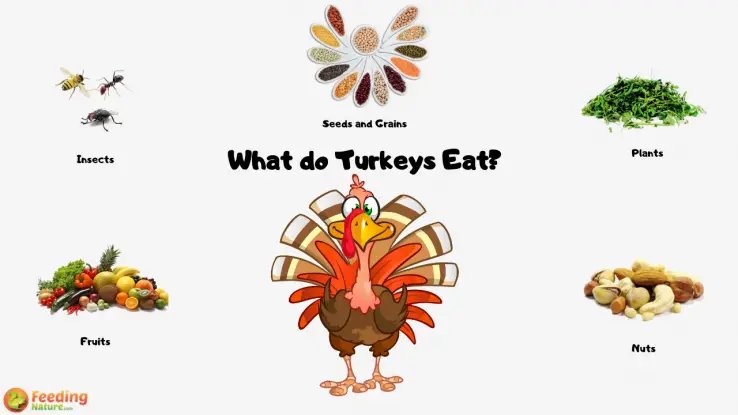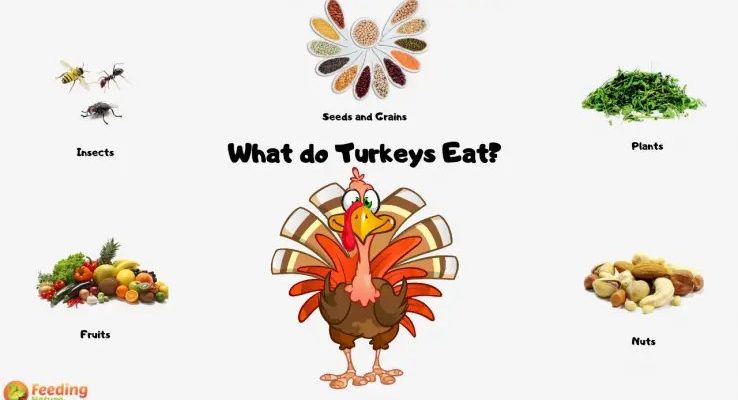
Let’s dive into the diet of these birds and explore how to provide them with the right nutrition. Knowing the right foods to feed them can keep them strong, active, and, dare I say, happy! Whether you’re raising turkeys for farming or just curious about these fascinating creatures, we’ll cover everything you need to know about their feeding habits and nutritional needs.
Understanding the Natural Diet of Turkeys
Turkeys are naturally omnivorous, which means they eat a wide variety of foods. In the wild, they hunt for insects, berries, seeds, and even small reptiles. Imagine strolling through the woods and spotting a turkey pecking at the ground—each morsel it picks up is part of its balanced diet.
The primary components of a wild turkey’s diet include:
- Insects: They’ll munch on grasshoppers, ants, and even beetles.
- Seeds and Nuts: Acorns, sunflower seeds, and grains are favorites.
- Plants: Turkeys love to eat leaves and berries, especially during warmer months.
In captivity, it’s crucial to mimic this natural foraging behavior. Providing a varied diet helps ensure they receive essential vitamins and minerals. Just like us, when turkeys eat a mix of foods, they get the nutrients they need to thrive.
Feeding Turkeys: Basics and Best Practices
When it comes to feeding your turkeys, a well-rounded diet is key. You might be wondering how to put this into practice. Here are some tips to make feeding time effective and enjoyable:
1. Choose Quality Feed: Look for high-quality poultry feed that contains the right blend of protein, vitamins, and minerals. This will usually be labeled as turkey starter or grower feed depending on their age.
2. Supplement with Grains: Turkeys benefit from occasional grains like corn, oats, and barley. These not only provide energy but also keep them busy foraging, which is important for their mental stimulation.
3. Add Fresh Fruits and Veggies: Just like you enjoy a salad, turkeys appreciate fresh produce. Items like leafy greens, carrots, and apples can be offered as treats.
4. Water Matters: Always provide fresh water. Turkeys drink a lot, especially during hot weather. It helps them digest their food and stay cool.
Following these basic practices can help ensure your turkeys get the right nutrients and grow healthy.
How Much to Feed Turkeys
Feeding your turkeys the right amount is just as important as what you feed them. This is where things can get a bit tricky. You don’t want to overfeed them, but you also don’t want to underfeed. So, how do you find that balance?
– Young Turkeys: Baby turkeys, or poults, require a special starter feed for the first 6-8 weeks. Generally, you can feed them about 1 ounce of starter feed per bird per day.
– Growing Turkeys: As they grow, you can switch to grower feed. On average, growing turkeys should eat about 1-2 pounds of feed a day, depending on their age and size.
– Adult Turkeys: Once turkeys reach adulthood, they can consume about 3-4 pounds of feed a day, along with foraged foods.
It’s also helpful to watch your turkeys during feeding. If they seem overly eager or are leaving excess food behind, you might need to adjust their portions.
Nutritional Requirements of Turkeys
Just like any other animal, turkeys need a balanced diet to stay healthy. Here’s a deeper look at the nutrients essential for turkeys:
– Protein: Young turkeys need higher protein levels (around 28% during the starter phase) to support growth. As they age, this can drop to about 20-22% for adults.
– Vitamins and Minerals: Key vitamins include A, D, E, and B vitamins. Minerals like calcium and phosphorus are crucial for strong bones and overall health. A deficiency in these can lead to health issues.
– Fats: Fats are essential for energy. A balanced diet provides about 5-10% fat for adult turkeys.
Again, making sure they get a mix of commercial feed and foraged items helps fulfill these nutritional needs.
Common Feeding Mistakes to Avoid
Even experienced turkey owners can make a few common mistakes when it comes to feeding. Here are some pitfalls to watch out for:
1. Overfeeding Treats: It’s tempting to give turkeys lots of treats, but too many can throw off their nutritional balance. Treats should make up no more than 10% of their diet.
2. Ignoring Fresh Water: Never forget to provide fresh water. Dehydration can lead to severe health issues, especially in hot weather.
3. Feeding Banned Foods: Certain foods can be harmful to turkeys. Avoid giving them chocolate, caffeine, or moldy food. These can be toxic and lead to serious health issues.
4. Neglecting Changes in Diet: As turkeys mature, their dietary needs change. Stick to age-appropriate feeds to support their growth and health.
Being aware of these mistakes can save you a lot of headaches down the road.
The Importance of Foraging and Natural Behavior
One of the unique aspects of turkeys is their natural foraging behavior. Allowing them to forage can deeply enhance their quality of life. It’s like giving them the freedom to explore a buffet. They get to choose their favorite items, which can make feeding time more enjoyable.
Foraging also helps:
– Encourage Exercise: As they search for food, turkeys engage in natural behaviors that promote physical health.
– Reduce Stress: A stimulating environment keeps turkeys happier and less stressed. Stress can lead to health issues, so keeping their mental health in check is just as important as their physical health.
– Provide Nutritional Variety: Natural foraging allows turkeys to get a diverse mix of nutrients that commercial feeds might not provide.
Giving your turkeys a space to roam while foraging can be a simple yet effective way to enhance their nutrition and well-being.
Feeding turkeys doesn’t have to be complicated. By keeping their natural diets and nutritional needs in mind, you’re setting them up for a healthy and happy life. Remember to provide high-quality feed, fresh fruits and veggies, and plenty of water. Watch their portion sizes and avoid common mistakes, and you’ll be on your way to becoming a great turkey caregiver.
So, the next time you see a turkey strutting about, you can appreciate not just its beauty but also the thoughtful care that goes into keeping it well-fed and happy. After all, a well-fed turkey is a joyful turkey!

